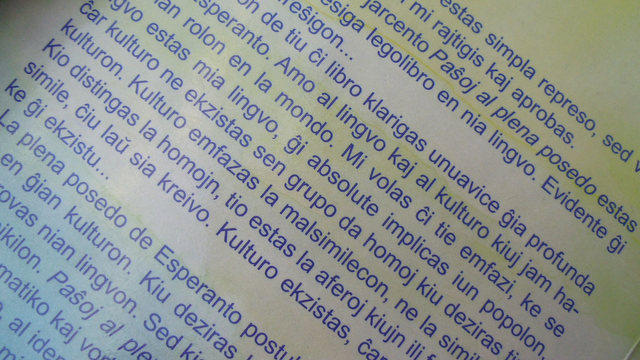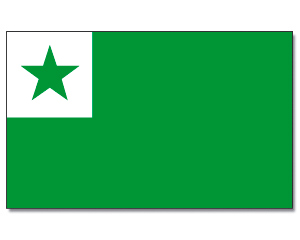The other International Language
For most educated people on earth English is the international language, the absolute necessary communication tool of the 21st century.
Huge amount of money and efforts are put into learning but even after years of studying its odd word order and unpredictable spelling most people feel inferior to mother tongue speakers of English.
The difference between the right and wrong order is so subtle that it is hard to explain beyond simply saying that it “just sounds right", not to mention the pronunciation of English words.
Apparently nowadays we need a common language to act globally. But the idea of having a universal language on hand is much older. The appearance of Esperanto at the end of the 19st century, seemed to be just in time. It was the first constructed language which really made it to a widely spoken language. However Esperanto never was officially really recognized and supported and somehow disappeared from the limelight. But why is it still around and not faded away like many other conlangs?

On DUOLINGO, the most used Internet language platform, more than
1.13M learners have signed in for a free language course. It is hard to explain what really attracts people around the world to learn Esperanto. Is it the fact, that Esperanto is the most easy language to learn with its logical structure and simple grammar? Or is it because many people feel a bit uncomfortable with English being the language of the most imperialist power on earth?
For L.Zamenhof, who created the basic of Esperanto, the language was much more than a communication tool. He called the underlying idea of the language "Interna ideo" which brings people together, emphasizes justice among the peoples, overcomes misunderstandings and rises an universal consciousness as precondition for world peace.
If you have never heard about Esperanto before and are curious to find out more, please carry on with reading:
Esperanto estas internacia lingvo, inventita antaŭ multaj jaroj. Ĝi estas facile lernebla kaj en multaj landoj de la mondo parolata...
Esperanto has a quite simple grammar (16 rules), and it is also completely regular with no exceptions. There are no irregular past tenses, no irregular plurals, no irregularly used prepositions… Additionally, the pronunciation is easy, and it is a complete phonetic language.
Nouns end in -o
Adjectives -a
Verbs are not conjugated and end in -as in the present tense, -os in future and -is in past tense
Plurals -j
Even most of the vocabulary comes from European languages the grammatical structure is rather non-European. Through a genial system of prefixes and suffixes added on to virtually any word you get a great variety of new words.
Lets take the word bela. Probably you already know, it is beautiful. Than we add to the word root the suffix -igi, means “to make, to cause to be”, so _beligi _means “make (something) beautiful”. If we furthermore use the prefix pli- means more, so _plibeligi _than means “to make it more beautiful”.
Instead of learning thousands of dissimilar words, you essentially need only a few hundred roots and use a few dozen affixes to become a fluent speaker.
Of course Esperanto is not perfect. It still evolves as a language and it needs a lot of effort to acquire it, however it works well.
What is your experience with language learning?

So true. English being the international language just becomes an excuse not to learn another language. I love learning new languages, especially helpful when you are traveling.
I heard about Esperanto and I met some people learning this language during my travels . Now without the verb conjugation, irregular tenses and plural, it might be easier for me to learn Esperanto!
En plej multaj landoj vivas esperantistoj, sed ne multaj. Tamen ekzistas bona komunumo de ili.
Bonan tagon!
Let me translate your comment:
[EO] Ankaŭ a-vortoj povas esti pluraformaj kaj ili havas finaĵon -aj
[EN] I'd like to mention that adjectives can be also plurals and then they have the ending "-aj".
So you should have written / Do, vi devintus skribi:
Vi estas tre atenta. Dankon!
Prenteze, Mi ja scias, ke vi estas lingvoŝatanto. Hodiaŭ mi vidis interesan lingvon, kiun mi ne komprenas:
https://steemit.com/love/@cleaner-myanmar/ghist-hearm-tuiom-lasty-2017124t154027951z
Ĉu vi scias pri kiu tiu lingvo temas? Eble fantazia.
Mi ne scias. Vi povas legi mian komenton tie, kie mi demandis, kio estas la lingvo. La respondon mi ricevis la jenan:
Mi tute ne komprenas ĝin...
Konklude mi diras, ke temas pri tute fantazia lingvo, kaj tiu afero estas ekzemplo por homoj, kiuj komprenas: Steemit ekzistas por gajni monon. Ne gravas kion mi verkas, nur kielmaniere mi povas gajni. Ne nesecas fariĝi moralisto pro tio. La ĉefa slogeno de Steemit ja estas: Money talks.
Ĉu vi eble spektas la filmserion "Black Mirror" aŭ almenaŭ la eron, kiu montras al spektantoj la mondon, kie la prestiĝo de ĉiu persono dependas de ... taksoj ricevataj de aliuloj ĉe iu socia retejo? En Steemit estas simile. Se viaj skribaĵoj estos bone pritaksata - vi gajnos la prestiĝon. Se ne ... vi neniam iĝos grava persono ĉe Steemit. Tial oni devas antaŭvidi, kio plaĉos al homoj ĉe Steemit kaj tion ĉi skribi. Tial ni ankaŭ ne povas skribi nur Esperante... Ni povas skribi pri Esperanto kiel pri nia ŝatokupo, ekzemple. Al kelkaj homoj tio povas plaĉi.
Resume, ni devas akcepti la anglan kiel la internacian lingvon.
Dankon :-) Bonege, ke vi skribis tion :-)
Mi pensas ke la plej granda problemo por lerni Esperanton estas ke la angla estas ĉie kaj vi lernas ĉiutage.
La plej granda problemo estas, ke mankas Esperantistoj en nia ĉirkaŭaĵo. Tial ni ne povas ĉiutage uzi Esperanton realvive. Kompreneble, oni povas Interrete, sed tio ne estas la plej bona solvo. Kial? Tial, ke poste povas okazi, ke oni ne scias la vortaron pri ĉiutaga vivo. Kaj imagu la jenan situacion: du esperantistoj estas en vendejo. Kaj unu volas demandi la alian, ĉu ili aĉetu ŝinkon. Sed povas montriĝi, ke:
(2a. la dua estas polo kaj rimarkas, ke "ŝinko" estas simila al la pola vorto "szynka" kaj tiel divenas, ke temas pri "ŝinko" - sed tiun ĉi situacion, kiu fakte okazeblas, mi menciis duonŝerce)
La alia problemo estas la krokodilado de Esperantistoj, kiuj vivas proksime unu de la alia. Tiel ili perdas grandan ŝancon praktiki Esperanton. En Lublino estas Esperantistoj, kiuj renkontiĝas ĉiun duan aŭ trian monaton. Sed ili parolas ĉiam pole...
Mi pensas ke ni povus mecenati la esperantan projekton. Sed cxu vi vidis kiom da homoj auxskultas esperantajn muzikojn spotifaje? Tre malmulte
Ĉu vi havas iun precizan ideon de tia projekto?
Cxu vi vidis miajn esperantajn konkursojn por poloj?
Ne, mi ne vidis. Ĉu vi povus sendi la ligilojn?
https://steemit.com/esperanto/@dotevo/konkurs-esperanto-2-250-follow
thank you for my first lesson! :)
dankon pro mia unua leciono!
Nedankinde! Bonan sukceson al via lernado. Vi povas uzi DUOLINGO aŭ LERNU !
Oh! Esparanto is like that. It's very good to have no exceptions.